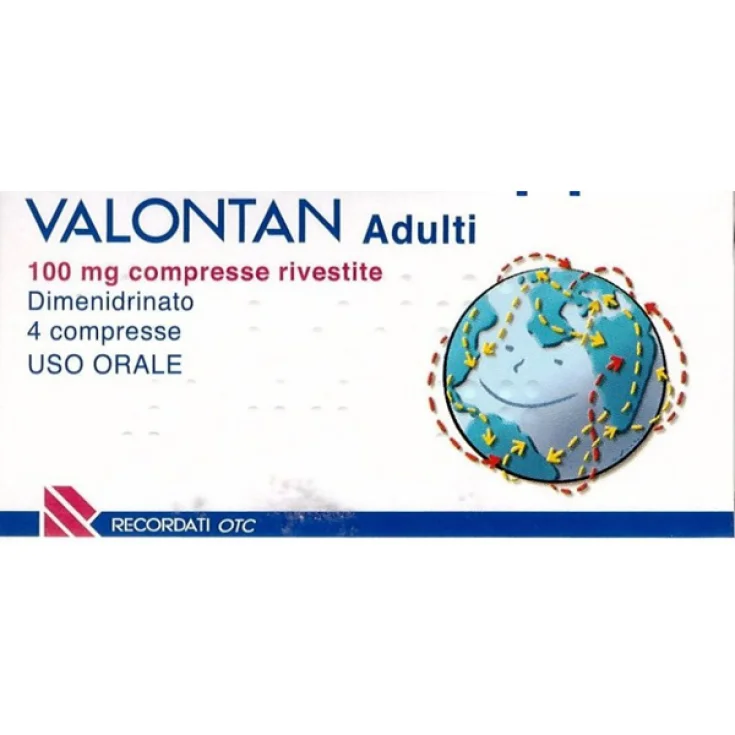Recordati Valontan Adult 100mg Prevention Nausea Seasickness Car Plane Train 4 Coated Tablets

- Brand: RECORDATI SpA
- Product Code: 003452012
- EAN:
- Availability: In Stock (evaso in 24 ore)
- 3 items
for 6,37€ each - 4 items
for 6,24€ each - 5 items
for 6,11€ each
Recordati
Valontan Adult 100mg
Sea Sickness Nausea Prevention Car Plane Train; 4 Coated Tablets
Active principles
Tablets Each coated tablet contains: Active ingredient Dimenhydrinate 100 mg
Excipients
Coated tablets Each coated tablet contains: Excipients sucrose 16.0 mg precipitated silica 5.0 mg magnesium stearate 7.0 mg corn starch 97.0 mg Coating components acrylic resin (Eudragit) 2.8 mg talc 0.2 mg
Therapeutic indications
Prevention and treatment of nausea, vomiting and vertigo, typical of naupathias (seasickness, car, train, plane sickness).
Contraindications
Hypersensitivity to the active substance, to other antihistamines, or to any of the excipients. Contraindicated in children under 2 years of age. Generally contraindicated during pregnancy and lactation.
Dosage
VALONTAN Adult Coated tablets In naupathy, nausea and vomiting can be controlled with a single dose of ½ tablet of Valontan Adult (50 mg), the effect of which lasts for approximately 4 hours; this dose, if necessary, can be repeated, for preventive purposes, every 4 hours (3 tablets in 24 hours).
Warnings and Precautions
The use of antihistamines at the same time as certain antibiotics or other ototoxic drugs can mask the early signs of ototoxicity, which can only reveal itself when the damage is irreversible. Use with caution in subjects suffering from glaucoma, prostatic hypertrophy, other urinary retention syndromes, intestinal obstruction, arterial hypertension, cardiovascular disease, bronchial asthma, chronic bronchitis or emphysema, hyperthyroidism. The medicine can exacerbate seizure disorders. It should therefore be used with great caution in subjects suffering from epilepsy. The tablets contain sucrose and are therefore not suitable for people with hereditary fructose intolerance, glucose-galactose malabsorption or sucrase-isomaltase deficiency.
Interactions
During treatment, avoid the simultaneous use of alcoholic beverages and antidepressant, hypnotic, sedative or tranquilizing drugs, in order to prevent any additive sedation phenomena (see also section 4.7).
Side effects
The most frequent side effect of antihistamines is sedation which can manifest as drowsiness. With the use of antihistamines, dry mouth, photosensitivity, accommodation disorders, urination disorders, headache, anorexia, nausea, allergic skin reactions may also occur. Less frequently dizziness, asthenia, insomnia (especially in children), euphoria, tremors, hypotension, tachycardia and, at high doses, especially in children, convulsions.
Pregnancy and breastfeeding
It is not recommended for use during pregnancy. In breastfeeding patients, it is necessary to decide whether to give up breastfeeding the baby and start the treatment or, vice versa, to continue breastfeeding avoiding the administration of the product.






